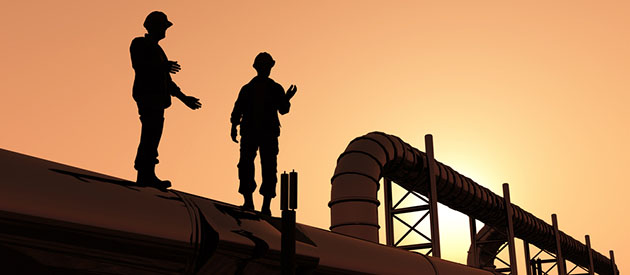Nat Gas Inventory in Record Territory
Source: Zacks Equity Research (3/30/12)
"Gas stocks, currently some 59% above the benchmark five-year average levels, are at their highest point for this time of the year, reflecting low demand amid robust onshore output."
The U.S. Energy Department's weekly inventory release showed a larger-than-expected increase in natural gas supplies, as record-warm March temperatures across the country have restricted the commodity’s requirement for power burn. In fact, the second injection of 2012 and the largest ever for March, has added to the already bloated inventories.
Gas stocks—currently some 59% above the benchmark five-year average levels—are at their highest point for this time of the year, reflecting low demand amid robust onshore output.
The Weekly Natural Gas Storage Report—brought out by the Energy Information Administration (EIA) every Thursday since 2002—includes updates on natural gas market prices, the latest storage level estimates, recent weather data and other market activities or events.
The report provides an overview of the level of reserves and their movements, thereby helping investors understand the demand/supply dynamics of natural gas.
It is an indicator of current gas prices and volatility that affect businesses of natural gas-weighted companies and related support plays like Anadarko Petroleum Corporation (APC), Chesapeake Energy (CHK), Encana Corporation (ECA), Devon Energy Corporation (DVN), Nabors Industries (NBR), Patterson-UTI Energy (PTEN), Helmerich & Payne (HP) and Halliburton Company (HAL).
Stockpiles held in underground storage in the lower 48 states rose by 57 billion cubic feet (Bcf) for the week ended March 23, 2012, above the guidance range (of 43–47 Bcf gain) as per the analysts surveyed by Platts, the energy information arm of McGraw-Hill Companies Inc (MHP).
The increase—the second injection of 2012—is well above last year’s build of 7 Bcf and the 5-year (2007–2011) average addition of 8 Bcf for the reported week.
As a result of last week’s stock build, the current storage level—at 2.437 trillion cubic feet (Tcf)—is now up 816 Bcf (50.3%) from last year and 900 Bcf (58.6%) over the five-year average.
With this huge and sharply widening natural gas surplus, inventories in underground storage have started to climb weeks earlier than the usual summer stock-building season. They have persistently exceeded the five-year average since late September last year and are likely to beat the previous winter (March 31) record of 2.1 Tcf set in 1983.
A supply glut has pressured natural gas prices during the past year or so, as production from dense rock formations (shale)—through novel techniques of horizontal drilling and hydraulic fracturing—remain robust, thereby overwhelming demand.
As a matter of fact, natural gas prices have dropped approximately 56% from 2011 peak of $4.92 per million Btu (MMBtu) in June to the current level of around $2.15 (referring to spot prices at the Henry Hub, the benchmark supply point in Louisiana). Incidentally, prices hit a 30-month low of $2.01 earlier in March.
To make matters worse, a near-record mild weather across most of the country curbed natural gas demand for heating all winter, leading to an early beginning for the stock-building season. The grossly oversupplied market continues to pressure commodity prices in the backdrop of sustained strong production.
This has forced several natural gas players to announce drilling/volume curtailments. Exploration and production outfits like Ultra Petroleum Corp. (UPL), Talisman Energy Inc. (TLM) and Encana have all reduced their 2012 capital budget to minimize investments in development drilling.
On the other hand, Oklahoma-based Chesapeake—the second-largest U.S. producer of natural gas behind Exxon Mobil Corp. (XOM)—and rival explorer ConocoPhillips (COP) have opted for production shut-ins to cope with the weak environment for natural gas that is likely to prevail during the year.
However, we feel these planned reductions will not be enough to balance out the massive natural gas supply/demand disparity and therefore we do not expect much upside in gas prices in the near term. In other words, there appears no reason to believe that the supply overhang will subside and natural gas will be out of the dumpster in 2012.
Zacks Equity Research
Gas stocks—currently some 59% above the benchmark five-year average levels—are at their highest point for this time of the year, reflecting low demand amid robust onshore output.
The Weekly Natural Gas Storage Report—brought out by the Energy Information Administration (EIA) every Thursday since 2002—includes updates on natural gas market prices, the latest storage level estimates, recent weather data and other market activities or events.
The report provides an overview of the level of reserves and their movements, thereby helping investors understand the demand/supply dynamics of natural gas.
It is an indicator of current gas prices and volatility that affect businesses of natural gas-weighted companies and related support plays like Anadarko Petroleum Corporation (APC), Chesapeake Energy (CHK), Encana Corporation (ECA), Devon Energy Corporation (DVN), Nabors Industries (NBR), Patterson-UTI Energy (PTEN), Helmerich & Payne (HP) and Halliburton Company (HAL).
Stockpiles held in underground storage in the lower 48 states rose by 57 billion cubic feet (Bcf) for the week ended March 23, 2012, above the guidance range (of 43–47 Bcf gain) as per the analysts surveyed by Platts, the energy information arm of McGraw-Hill Companies Inc (MHP).
The increase—the second injection of 2012—is well above last year’s build of 7 Bcf and the 5-year (2007–2011) average addition of 8 Bcf for the reported week.
As a result of last week’s stock build, the current storage level—at 2.437 trillion cubic feet (Tcf)—is now up 816 Bcf (50.3%) from last year and 900 Bcf (58.6%) over the five-year average.
With this huge and sharply widening natural gas surplus, inventories in underground storage have started to climb weeks earlier than the usual summer stock-building season. They have persistently exceeded the five-year average since late September last year and are likely to beat the previous winter (March 31) record of 2.1 Tcf set in 1983.
A supply glut has pressured natural gas prices during the past year or so, as production from dense rock formations (shale)—through novel techniques of horizontal drilling and hydraulic fracturing—remain robust, thereby overwhelming demand.
As a matter of fact, natural gas prices have dropped approximately 56% from 2011 peak of $4.92 per million Btu (MMBtu) in June to the current level of around $2.15 (referring to spot prices at the Henry Hub, the benchmark supply point in Louisiana). Incidentally, prices hit a 30-month low of $2.01 earlier in March.
To make matters worse, a near-record mild weather across most of the country curbed natural gas demand for heating all winter, leading to an early beginning for the stock-building season. The grossly oversupplied market continues to pressure commodity prices in the backdrop of sustained strong production.
This has forced several natural gas players to announce drilling/volume curtailments. Exploration and production outfits like Ultra Petroleum Corp. (UPL), Talisman Energy Inc. (TLM) and Encana have all reduced their 2012 capital budget to minimize investments in development drilling.
On the other hand, Oklahoma-based Chesapeake—the second-largest U.S. producer of natural gas behind Exxon Mobil Corp. (XOM)—and rival explorer ConocoPhillips (COP) have opted for production shut-ins to cope with the weak environment for natural gas that is likely to prevail during the year.
However, we feel these planned reductions will not be enough to balance out the massive natural gas supply/demand disparity and therefore we do not expect much upside in gas prices in the near term. In other words, there appears no reason to believe that the supply overhang will subside and natural gas will be out of the dumpster in 2012.
Zacks Equity Research


























































